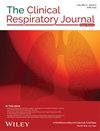Study Protocol of the Korean EGFR Registry: A Multicenter Prospective and Retrospective Cohort Study in Nonsmall Cell Lung Cancer Patients With EGFR Mutation
Abstract
Introduction
The provision of treatment for epidermal growth factor receptor (EGFR)-mutated nonsmall cell lung cancer (NSCLC) patients has increased in Korea. However, multicenter studies on the clinicopathologic dataset and treatment outcomes, using a large-scale dataset, have not been conducted. The current study is a prospective and retrospective multicenter observational cohort study that registers all stages of EGFR-mutated NSCLC patients.
Methods
The Korean EGFR Registry was designed to enroll 2000 patients with all stages of EGFR-mutated NSCLC from 40 university hospitals across Korea. This study, encompassing both retrospective and prospective cohorts, aims to analyze clinical characteristics, treatment modalities, and outcomes in these patients. Data collection will include patient demographics, smoking history, quality of life assessments, pathological data, and treatment outcomes, with follow-up until December 2026. The primary endpoint is disease-free survival in patients who have undergone radical therapy (surgery and radiotherapy) or progression-free survival in those receiving targeted therapy (first, second, and subsequent lines), chemotherapy (first and subsequent lines), combination therapy, and palliative/maintenance therapy according to stages of EGFR-mutated NSCLC. The study will explore the diagnostic methods for EGFR mutations, clinical outcomes based on treatment modalities, and metastatic patterns in EGFR-mutated NSCLC patients. Moreover, it will investigate various aspects, including the safety and efficacy of a new third-generation EGFR tyrosine kinase inhibitor (TKI), lazertinib, approved for both first- and second-line treatments.
Discussion
This study is expected to provide valuable insights into the epidemiology, risk factors, progression, and treatment outcomes of EGFR-mutated NSCLC in Korea. The Korean EGFR Registry will contribute significantly to the understanding of the complex dynamics of EGFR-mutated NSCLC, aiding in the development of more effective and personalized treatment strategies.


 求助内容:
求助内容: 应助结果提醒方式:
应助结果提醒方式:


